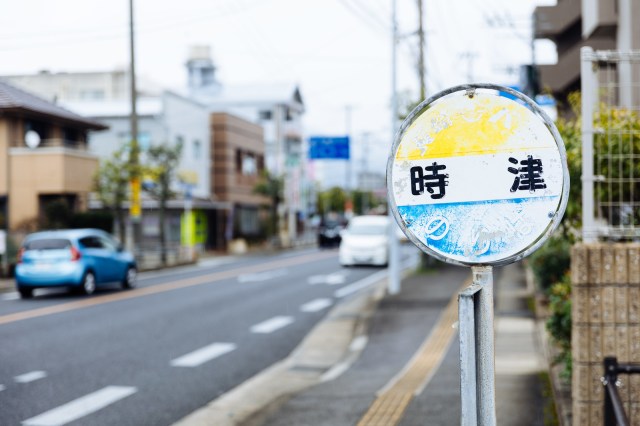
Staff say they just wanted to catch the bus home.
On 10 March, the Funabashi City Board of Education in Chiba Prefecture announced it had disciplined a number of staff for leaving the office two minutes early. Staff say they left early because they wanted to get an earlier bus home.
The Board of Education found 316 incidences of early departures from May 2019 to January 2021, involving seven staff members. The ringleader was found to be a 59-year-old woman in charge of attendance management, who was working at a counsellor level in the Lifelong Learning Department.
The counsellor was disciplined for taking the initiative in defrauding timecards, which recorded departure times as 5:15 p.m., although she and other staff were leaving at 5:13 p.m. in order to catch the 5:17 p.m. bus.
Other habitual offenders included a 27-year-old male director and a woman in her 60s, both employed this fiscal year, who received written reprimands. Four other staff members, also employed this fiscal year, were given strict cautions for punching out early.
The time-swindling ringleader has been punished with a one-tenth reduction in salary for three months. This salary cut is expected to reimburse the Board of Education with approximately 137,000 yen (US$1,260) to cover the unreported leave accumulated.
According to the Board of Education, when asked why they had knocked off before their assigned finishing time, staff said they “wanted to go home early.” If they missed the bus at 5:17, the next bus wouldn’t arrive until 30 minutes later, at 5:47 p.m.
People in Japan expressed sympathy for the plight of the workers, saying:
“How many companies pay properly on a minute-by-minute basis? If that were the case, then staff who work one minute overtime should get paid for it.”
“They’re still using timecards? So outdated.”
“It would be nice if, when they found out about the bus timetable, they could make some flexible arrangement for government workers like getting them to come in a bit earlier instead.”
“Wouldn’t it be nice if the bus service timetable could be changed?”
“Civil servants can’t have flexible work arrangements–they should talk to the union about changing working hours or switching to a flex-time system.”
“People already arrive at least five minutes earlier than their scheduled time for work, so you’d think it would be okay for them to leave two minutes early.”
In Japan, it’s often said that if you’re not ten minutes early to an appointment then you’re late, so it’s common for staff to arrive ten minutes earlier than their scheduled start time to stay in everyone’s good books.
That doesn’t mean you can ever leave early, though, because just as unpaid early arrivals are the norm, so too are unpaid overtimes, which these workers may now find themselves doing for roughly 20 minutes a day, unless the bus company decides to change its schedule.
Source: Sankei News via Jin
Top image: Pakutaso (edited by SoraNews24)
Insert image: Pakutaso
● Want to hear about SoraNews24’s latest articles as soon as they’re published? Follow us on Facebook and Twitter!


 Train driver sues Japan Rail…over 56 yen for a one-minute delay
Train driver sues Japan Rail…over 56 yen for a one-minute delay Japanese government mulling over potential four-day working week
Japanese government mulling over potential four-day working week Japanese PM asks schools around Japan to close as coronavirus cases rise
Japanese PM asks schools around Japan to close as coronavirus cases rise Muji designs cool all-weather self-driving shuttle bus, aims to implement it in Finland in 2020
Muji designs cool all-weather self-driving shuttle bus, aims to implement it in Finland in 2020 Teacher disciplined for drinking alcohol during class in Japan
Teacher disciplined for drinking alcohol during class in Japan McDonald’s new Happy Meals offer up cute and practical Sanrio lifestyle goods
McDonald’s new Happy Meals offer up cute and practical Sanrio lifestyle goods All-you-can-drink Starbucks and amazing views part of Tokyo’s new 170 meter-high sky lounge
All-you-can-drink Starbucks and amazing views part of Tokyo’s new 170 meter-high sky lounge Studio Ghibli glasses cases let anime characters keep an eye on your spectacles
Studio Ghibli glasses cases let anime characters keep an eye on your spectacles McDonald’s Japan releases a pancake pie for new retro kissaten coffeeshop series
McDonald’s Japan releases a pancake pie for new retro kissaten coffeeshop series Kyoto’s 100 Demons yokai monster parade returns!
Kyoto’s 100 Demons yokai monster parade returns! Super Nintendo World expansion gets delayed for several months at Universal Studios Japan
Super Nintendo World expansion gets delayed for several months at Universal Studios Japan The oldest tunnel in Japan is believed to be haunted, and strange things happen when we go there
The oldest tunnel in Japan is believed to be haunted, and strange things happen when we go there Disney princesses get official manga makeovers for Manga Princess Cafe opening in Tokyo
Disney princesses get official manga makeovers for Manga Princess Cafe opening in Tokyo Tokyo’s new burger chain isn’t new, is disappointing, tasty, and hopeful all at once【Taste test】
Tokyo’s new burger chain isn’t new, is disappointing, tasty, and hopeful all at once【Taste test】 Beautiful Sailor Moon manhole cover coasters being given out for free by Tokyo tourist center
Beautiful Sailor Moon manhole cover coasters being given out for free by Tokyo tourist center More foreign tourists than ever before in history visited Japan last month
More foreign tourists than ever before in history visited Japan last month Starbucks reopens at Shibuya Scramble Crossing with new look and design concept
Starbucks reopens at Shibuya Scramble Crossing with new look and design concept Beautiful new Final Fantasy T-shirt collection on the way from Uniqlo【Photos】
Beautiful new Final Fantasy T-shirt collection on the way from Uniqlo【Photos】 Is the new Shinkansen Train Desk ticket worth it?
Is the new Shinkansen Train Desk ticket worth it? Foreign English teachers in Japan pick their favorite Japanese-language phrases【Survey】
Foreign English teachers in Japan pick their favorite Japanese-language phrases【Survey】 Japanese convenience store packs a whole bento into an onigiri rice ball
Japanese convenience store packs a whole bento into an onigiri rice ball We try out “Chan Ramen”, an underground type of ramen popular in the ramen community
We try out “Chan Ramen”, an underground type of ramen popular in the ramen community Studio Ghibli releases Kiki’s Delivery Service chocolate cake pouches in Japan
Studio Ghibli releases Kiki’s Delivery Service chocolate cake pouches in Japan Japan’s bone-breaking and record-breaking roller coaster is permanently shutting down
Japan’s bone-breaking and record-breaking roller coaster is permanently shutting down New definition of “Japanese whiskey” goes into effect to prevent fakes from fooling overseas buyers
New definition of “Japanese whiskey” goes into effect to prevent fakes from fooling overseas buyers Our Japanese reporter visits Costco in the U.S., finds super American and very Japanese things
Our Japanese reporter visits Costco in the U.S., finds super American and very Japanese things Studio Ghibli unveils Mother’s Day gift set that captures the love in My Neighbour Totoro
Studio Ghibli unveils Mother’s Day gift set that captures the love in My Neighbour Totoro Foreign passenger shoves conductor on one of the last full runs for Japan’s Thunderbird train
Foreign passenger shoves conductor on one of the last full runs for Japan’s Thunderbird train Domino’s Japan now sells…pizza ears?
Domino’s Japan now sells…pizza ears? New Japanese KitKat flavour stars Sanrio characters, including Hello Kitty
New Japanese KitKat flavour stars Sanrio characters, including Hello Kitty Kyoto creates new for-tourist buses to address overtourism with higher prices, faster rides
Kyoto creates new for-tourist buses to address overtourism with higher prices, faster rides Sales of Japan’s most convenient train ticket/shopping payment cards suspended indefinitely
Sales of Japan’s most convenient train ticket/shopping payment cards suspended indefinitely Sold-out Studio Ghibli desktop humidifiers are back so Totoro can help you through the dry season
Sold-out Studio Ghibli desktop humidifiers are back so Totoro can help you through the dry season Japanese government to make first change to romanization spelling rules since the 1950s
Japanese government to make first change to romanization spelling rules since the 1950s Ghibli founders Toshio Suzuki and Hayao Miyazaki contribute to Japanese whisky Totoro label design
Ghibli founders Toshio Suzuki and Hayao Miyazaki contribute to Japanese whisky Totoro label design Doraemon found buried at sea as scene from 1993 anime becomes real life【Photos】
Doraemon found buried at sea as scene from 1993 anime becomes real life【Photos】 Tokyo’s most famous Starbucks is closed
Tokyo’s most famous Starbucks is closed One Piece characters’ nationalities revealed, but fans have mixed opinions
One Piece characters’ nationalities revealed, but fans have mixed opinions We asked a Uniqlo employee what four things we should buy and their suggestions didn’t disappoint
We asked a Uniqlo employee what four things we should buy and their suggestions didn’t disappoint Princesses, fruits, and blacksmiths: Study reveals the 30 most unusual family names in Japan
Princesses, fruits, and blacksmiths: Study reveals the 30 most unusual family names in Japan Meet the the 90-year-old Japanese woman who is McDonald’s Japan’s oldest female employee
Meet the the 90-year-old Japanese woman who is McDonald’s Japan’s oldest female employee Osaka to Fukuoka for less than 40 bucks? It’s possible with Japan’s overnight ferry
Osaka to Fukuoka for less than 40 bucks? It’s possible with Japan’s overnight ferry Bus driver in Yokohama City announces warm message to the mother of a screaming child
Bus driver in Yokohama City announces warm message to the mother of a screaming child Vending machines in Tokyo Station not getting restocked, exploitative “black company” to blame
Vending machines in Tokyo Station not getting restocked, exploitative “black company” to blame Tokyu Bus alight button is yours to own, pushing all the right buttons
Tokyu Bus alight button is yours to own, pushing all the right buttons Japan’s Shachi Bus offers tour with no destination or leaving the bus, but something’s fishy…
Japan’s Shachi Bus offers tour with no destination or leaving the bus, but something’s fishy… Japanese bus driver chases down groper who targeted 18-year-old girl on his vehicle
Japanese bus driver chases down groper who targeted 18-year-old girl on his vehicle Late to bed, early to rise: Statistics suggest Japan seriously skimps on sleep
Late to bed, early to rise: Statistics suggest Japan seriously skimps on sleep Things go from scary to sweet when Japanese traveler meets tattooed man on bus overseas【Manga】
Things go from scary to sweet when Japanese traveler meets tattooed man on bus overseas【Manga】 JAL voted most reliable airline in the world
JAL voted most reliable airline in the world It opens next year?! We go to the Shanghai Disneyland site, find a lonely river in a field
It opens next year?! We go to the Shanghai Disneyland site, find a lonely river in a field Bus driver’s kind service towards blind passenger wins praise from Taiwanese netizens
Bus driver’s kind service towards blind passenger wins praise from Taiwanese netizens Naturally brown-haired Osaka student sues government for forcing her to dye her hair black
Naturally brown-haired Osaka student sues government for forcing her to dye her hair black Japanese train company issues official apology for “inexcusable” 25-second early departure
Japanese train company issues official apology for “inexcusable” 25-second early departure Students go nearly a year without textbooks after teacher forgets to hand them out
Students go nearly a year without textbooks after teacher forgets to hand them out
Leave a Reply